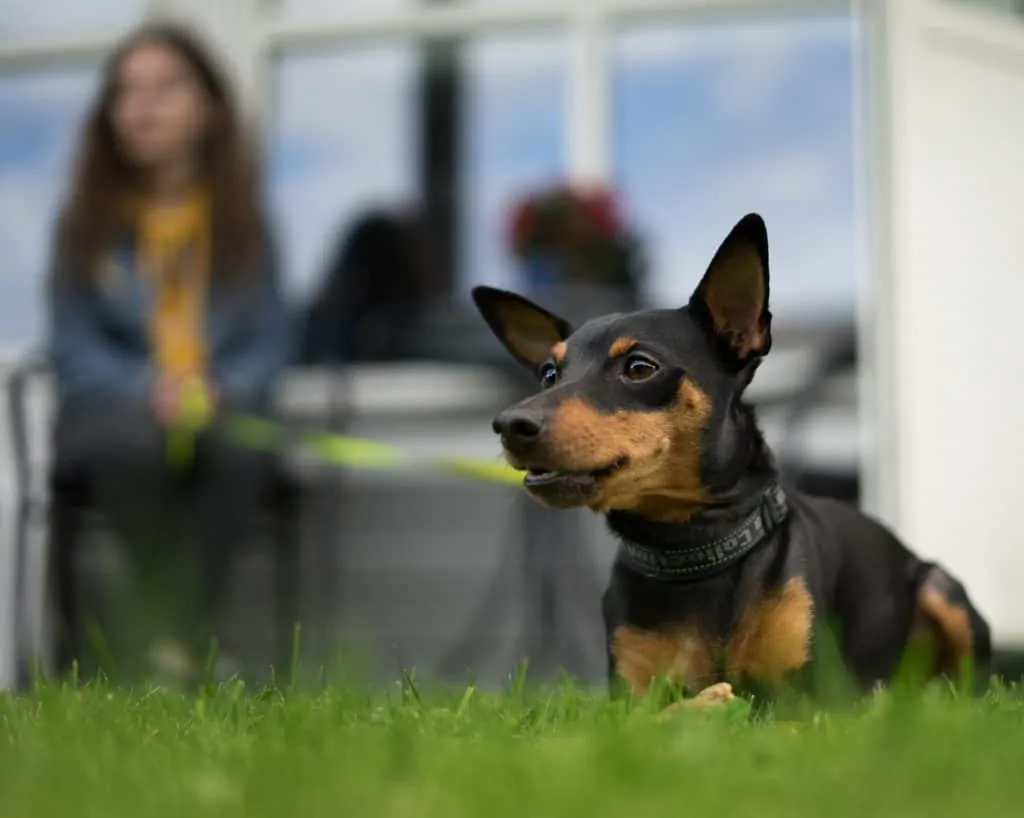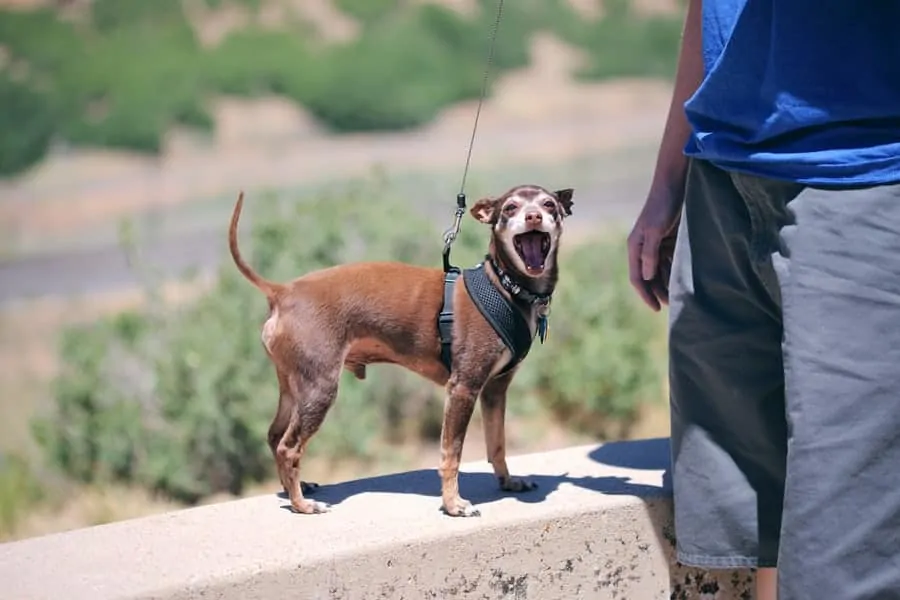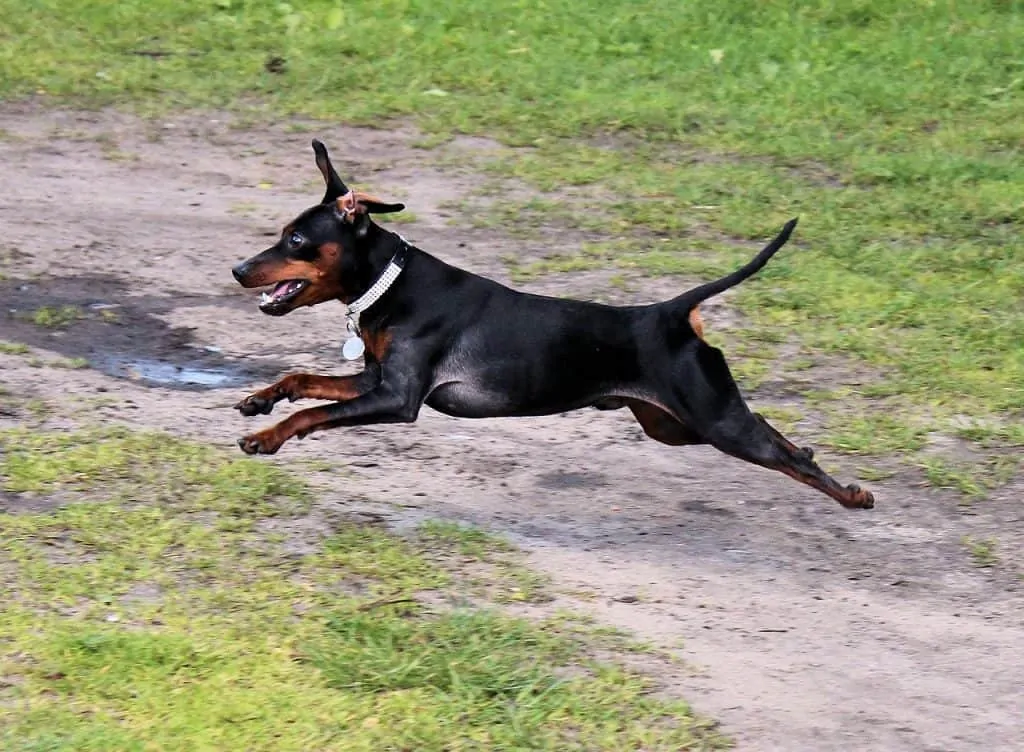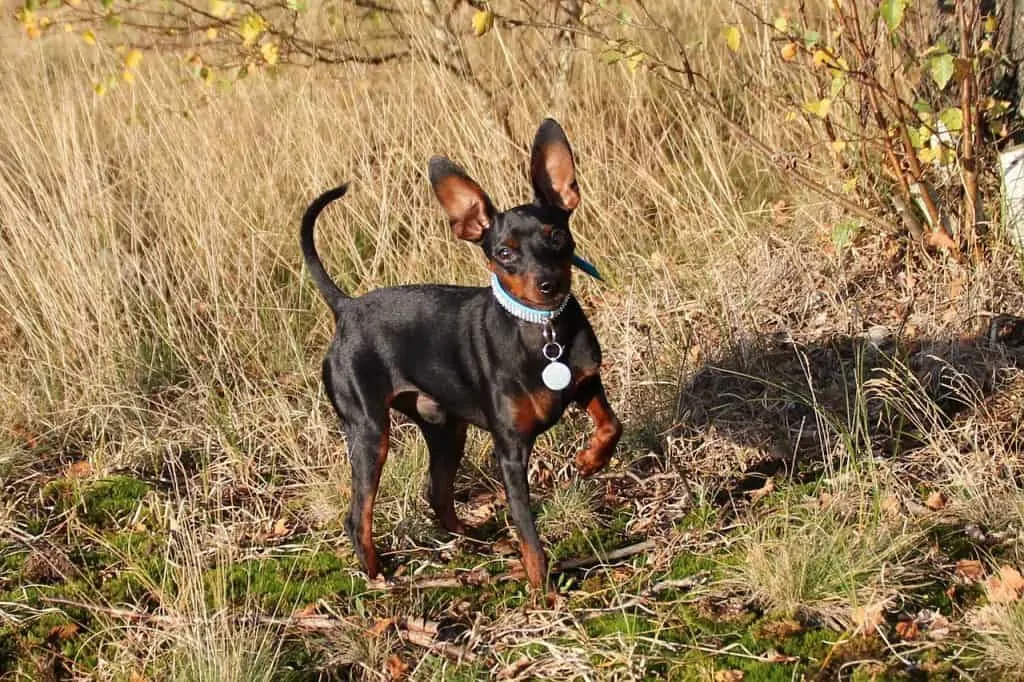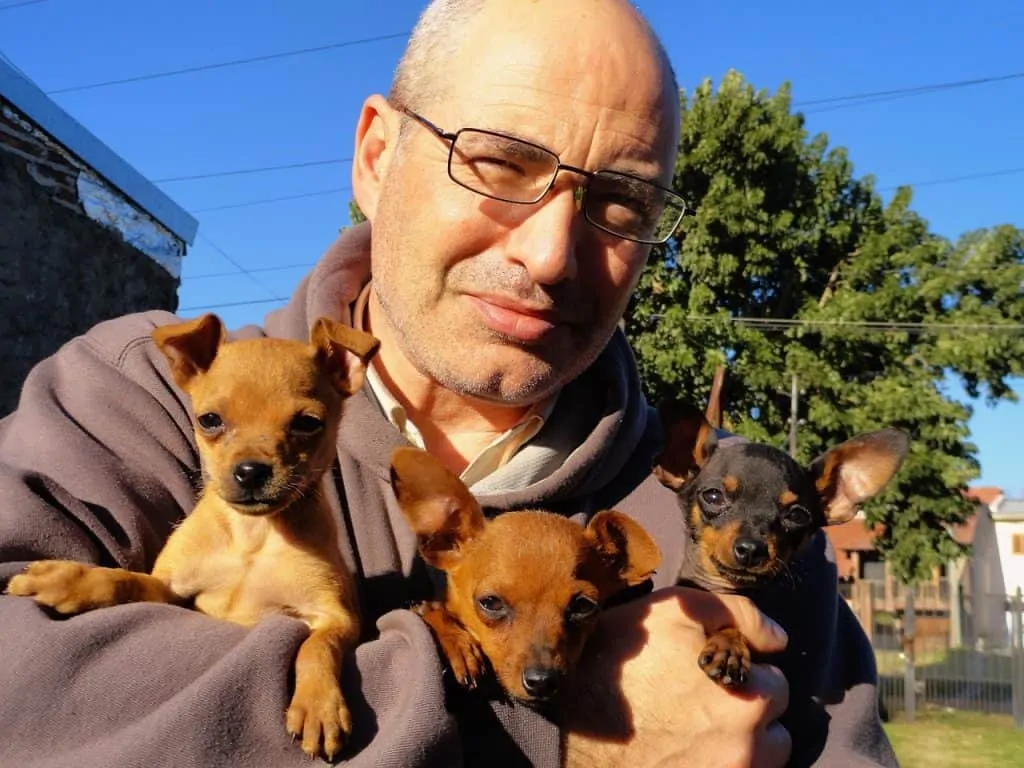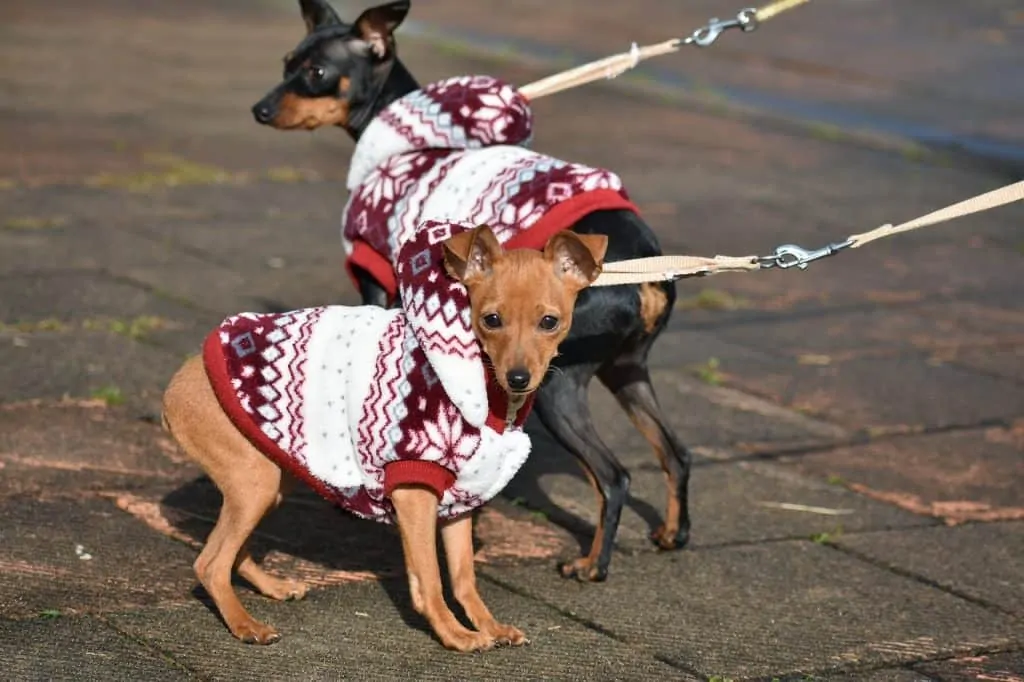There are plenty of toy dogs known for their big personalities, but it’s hard to find a tiny dog that comes close to the Miniature Pinscher when it comes to exuding such charm, appearance, and self-importance.
The Miniature Pinscher, famous for his gorgeous look, fanciful gait, and keen intelligence, makes a wonderful addition to active families and hands-on dog owners who are looking for a tiny breed with lots of pep.
Of course, the MinPin can also be bossy, domineering, and territorial if not properly trained and socialized.
Do you have what it takes to raise a Miniature Pinscher? Join us today as we learn more about this dynamic little dog breed and find out if he would make the right addition to your family and lifestyle.
Contents
What Is A Miniature Pinscher?
MinPin dogs are toy breeds originally bred for ratting in Germany.
Hailing from Germany and centuries old, the Miniature Pinscher was originally bred as a ratting dog. His primary tasks were to chase rats from buildings and factories, following them to and fro in tightly cramped spaces.
For this reason, it was important the Miniature Pinscher was small, agile, and brave. Fearless and funny, the Miniature Pinscher soon found his way out of ratting and became a popular show dog throughout Europe.
Dog enthusiasts were charmed by his human-like demeanor, comedic timing, and vivacious intelligence.
Often mistaken for a bred down version of a Doberman Pinscher, the Miniature Pinscher is actually believed to be a cross between Greyhounds and Dachshund breeds.
Today, the Miniature Pinscher ranks at number 70 out of 194 on the American Kennel Club’s list of America’s Most Popular Dog Breeds.
Miniature Pinscher Temperament And Personality Traits
Miniature Pinscher dogs are known for being funny, intelligent and proud.
Charming, courageous, and alert, the Miniature Pinscher is full of energy and beloved for his expressive face and demeanor. He is certainly a people-pup and enjoys being with his family as often as possible, though he can be territorial over food and toys.
The MinPin can do well with older, more respectful children who understand how to gently interact with a small dog, but he may be impatient with younger kiddos who handle him too roughly.
Miniature Pinschers are highly intelligent dogs and eager to please, though they can be known to exhibit some stubborn behaviors. If they learn they can push you around, they certainly will. An improperly trained Miniature Pinscher will rule the roost, no doubt about it. These dogs do make excellent watch dogs despite their puny size, though this can be challenging for some. Their big-dog bark can be especially problematic in tight quarters or in apartments where walls are thin.
That said, when properly trained and socialised, the Miniature Pinscher is a delight. He enjoys big adventures, lots of playtime, and snuggling on the laps and in the beds of his favorite people.
Because he is so intelligent and so family oriented, the Miniature Pinscher can be prone to suffering from separation anxiety and destructive behaviors if his mental, physical and social needs are not met.
Furthermore, while Miniature Pinschers can get along well with other, smaller dogs when raised and socialized with them, they do have a tendency to be territorial and even aggressive. With that being said, we should note that many Miniature Pinscher owners say their dogs do wonderfully with the family cat.
What Does The Miniature Pinscher Look Like?
The Miniature Pinscher is often mistaken for a bred-down version of the Doberman, but this is not true.
Small but mighty, the Miniature Pinscher is a proud and beautiful little dog who’s looks compliment his incomparable personality.
Let’s take a closer look at what the average Miniature Pinscher dog might look like.
Miniature Pinscher Height: 10 – 12.5 Inches
Miniature Pinscher Weight: 8 – 10 Lbs
Miniature Pinscher Coat Color: Stag red, Chocolate & Rust, Black & Tan, Chocolate & Tan, Red, Black & Rus.
Coat Type: Short and smooth, moderately shedding.
Miniature Pinscher Appearance Overview:
There is a reason the Miniature Pinscher is often assumed to be a smaller version of the Doberman, and it’s not just the name. The MinPin even looks like a bred-down version of the Doberman Pinscher, though the two are truly not related in the slightest.
That said, the Miniature Pinscher does carry some of the Doberman’s same physical characteristics. He has pointed ears, a delicate build, and sometimes even has the same coloring.
He is also a long-legged pup and is compact in shape. His coat is smooth and glossy and comes in two base colors of varying shades. His round eyes are alert and his proud demeanor gives him an air of confidence in spite of his tiny size.
How Do You Groom a Miniature Pinscher?
Your minpin’s nails should be ground down routinely to keep them from cracking or splitting.
Due to his small size and smooth coat, grooming your Miniature Pinscher is relatively simple. While he does shed and will shed more so during shedding seasons in spring and fall, the MinPin only requires moderate brushing once every week or so.
Like all dogs, the Miniature Pinscher should have his ears cleaned and checked regularly to keep them free of debris, build-up and moisture. Doing so properly can help prevent ear infections and other problems.
When it comes to bathing, Miniature Pinschers only need to be bathed once every six to eight weeks. They should be washed with a quality dog shampoo in warm water and towel dried thoroughly to ensure they do not get cold after baths.
The MinPin should also have his nails trimmed or ground down regularly to keep them from splitting or cracking and his teeth should be brushed daily using a quality dog toothbrush for small dogs and a canine-safe dog toothpaste.
Please note that tooth care for your Miniature Pinscher is especially important as, like most toy breeds, the MinPin can be prone to early tooth loss and dental disease.
But what other health issues are Miniature Pinscher dogs prone to? Keep reading to find out.
The Average Lifespan and Common Health Issues Of A Miniature Pinscher
Miniature Pinschers can live up to 16 years.
Like many small dog breeds, the Miniature Pinscher has a decent lifespan of around 12 to 16 years, though he can live longer if conditions are right. And while the Miniature Pinscher dog is generally a healthy one, there are some genetic health issues this breed can be susceptible to.
These health issues include but are not limited to:
- Progressive Retinal Atrophy
- Legg-Calve-Perthes Disease
- Hypothyroidism
- Epilepsy
- Demodectic Mange
- Mitral Valve Disease
- Cataracts
- Luxating Patella
- And Allergies
Because they are so small, Miniature Pinscher dogs can also be sensitive to colder weather. These are indoor dogs who should not be left outside alone for too long and should wear a sweater in very cold weather conditions.
According the the National Breed Club, Miniature Pinscher dogs should only undergo one recommended health test:
- Patella Evaluation
Along with making sure your Miniature Pinscher has been health screened for the above health issues that most commonly affect the breed, you can also keep up on your dog’s health by following the below tips:
Exercise
Miniature PInscher dogs may be small, but they still need routine exercise each and every day to ensure they are happy and healthy. Remember, these dogs are active and were initially bred as ratting dogs, which means they are prone to quick bursts of energy.
Likely descending from Greyhounds, the MinPin is a natural runner. He will do well with jogs around the neighborhood, brisk daily walks, or even a good half hour to forty minute game of fetch in the backyard.
Diet
Like all dogs, the MinPin will do best on a high quality dog food specified for his age, weight and activity level. As he is a toy breed, we recommend finding a dog food that is designed for small dog breeds under 15 pounds.
There are different types of dog foods to choose from for your Miniature Pinscher including dry dog food, wet dog food and raw dog food. Some MinPin owners even opt to make homemade dog food for their Miniature Pinscher, though doing so should be done under the guidance of a veterinarian.
Because Miniature Pinscher dogs can be prone to allergies, they may do best on a hypoallergenic dog food that is grain free and made with limited ingredients.
Proper Grooming
Though he doesn’t need extensive grooming, you should still keep up on brushing and caring for your Miniature Pincher’s grooming needs. This includes caring for his ears, nails, teeth and coat.
Routine Vet Visits
Last, try and maintain routine veterinary visits. Ensuring your Miniature Pinscher is up to date on his vaccines and continues seeing his vet for wellness checkups can not only help to maintain his overall health, but even prevent potential health issues in the future.
What Are The Training And Exercise Requirements For A Miniature Pinscher?
Though small, MinPins need routine exercise every single day.
Don’t let your Miniature Pincher’s small size fool you. This little dog has a great big personality and can be stubborn if not properly trained and socalizaled. He can have a bad habit of resource guarding, meaning he can be territorial over treats, toys, food and even his favorite people.
To help quell this problem, ensure you properly train and socialize your Miniature Pinscher at an early age. Training should be done using positive reinforcement methods like treats and praise, and punishments like scolding should be avoided.
The Miniature Pinscher is a sensitive dog who is very people oriented, and he will likely shut down if he feels you are not pleased with him.
Like many small dogs, house training your Miniature Pinscher can be somewhat of a challenge. Keep an eye on him during puppyhood and take him to his potty spot often. Reward him for going potty in the right places with treats and praise, and use repetition.
Because of his small size, Miniature Pinscher dogs can be ideal dogs to learn to potty on potty pads. This can help keep accidents from occurring in the home and even give owners a bit more freedom to not have to stick to as much of a schedule in the long run.
With that said, training your Miniature Pinscher to use the bathroom on a potty pad should be implemented just as you would train him to potty outside. Reward him with treats and praise and use repetition and consistency to ensure training sticks.
Socialization and obedience classes are also key to ensuring your Miniature Pinscher puppy grows up happy and well-rounded.
Obedience classes can help your Miniature Pinscher learn good manners in the home and better understand what is expected of him. Socialization can help reduce anxiety and the potential for aggressive or territorial behaviors.
Miniature Pinschers are naturally wary of strangers, so it’s important to introduce him to as many new people as possible in his puppyhood and make sure these introductions are positive. We also recommend gently playing with your MinPin dog’s paws, face, ears, and tail often to help him get used to having these places on his body handled by people.
What Are Some Pros And Cons Of Owning A Miniature Pinscher Dog?
There are pros and cons to owning a MinPin that any potential owner should consider.
The Miniature Pinscher is certainly beloved by those who take the time to learn and understand the breed, but he is not the ideal dog for every family or lifestyle.
Here are some pros and cons to owning a Miniature Pinscher you should know about and consider before you decide to get one of your own:
Pros To Owning A Miniature Pinscher:
- They are small dogs who are easy to travel with
- Miniature Pinschers are highly intelligent
- They are eager to please and quick to learn
- They do well in apartments and do not need lots of space
- They become very bonded with their family
- Miniature Pinscher only require moderate grooming
- They are relatively healthy dogs
- They are inexpensive to keep
Cons To Owning A Miniature Pinscher:
- They can be territorial
- MinPins have a tendency to be bossy
- They do not do well with small children
- They can be aggressive towards other dogs
- Housetraining can be challenging
- They can be very vocal
- They may suffer from separation anxiety
- MinPins can exhibit behavioral problems and destructive behaviors if left alone for too long
What Is The Ideal Home Type For A Miniature Pinscher Dog?
Miniature Pinschers will do best in homes with hands-on owners and families with older children.
Because Miniature Pinschers are so small, they will do best in homes with singles, adults, seniors, or families with older children. They are not the ideal dogs for homes with smaller children or homes with other, larger dogs.
Miniature Pinscher dogs can be territorial and even aggressive towards other dogs and often do best in homes where they are the only pooch. That said, they can get along well with cats.
Due to their small size, Miniature Pinschers are wonderful apartment dogs, though remember they are vocal and bark often. If you have thin apartment walls, the Miniature Pinscher could be problematic for nearby neighbors.
This is a dog breed who does well in active families and is a great travel companion. He enjoys adventures and will love doing most anything as long as he is with his people.
With that in mind, the Miniature Pinscher is not a good dog for those with busy work schedules or for people who are away often. Remember, the Miniature Pinscher becomes very attached to his family and can become depressed, anxious, and even exhibit some behavioral problems if left home alone for too long.
Choosing A Miniature Pinscher Puppy Or Rescue Dog – Tips On Finding The Healthiest Miniature Pinscher Possible
Going through reputable breeders or shelters to get your Miniature Pinscher puppy or dog is always your safest option.
While all dogs can be prone to certain genetic health issues, you can work to ensure you start your Miniature Pinscher off on the right paw by getting him from a reputable breeder or rescue shelter.
If you plan on buying your Miniature Pinscher through a breeder, be prepared to spend between $1,000 to $6,000. The price will vary depending on the breeder and your Miniature Pinscher puppy’s parent breeds. Miniature Pinscher puppies bred for show or who come from show-quality parents are typically more expensive than those that are bred solely for companionship.
Because Miniature Pinscher dogs can be so costly, many people attempt to cut corners by going through outside sources like backyard breeders or online sellers that are not certified. While doing so can get you a puppy for less money up front, you may wind up spending much more money in the long run if the puppy you purchase is sick.
Furthermore, backyard breeders and online sellers may also be aligned with puppy mills, who are notorious for illegally raising and selling sick and unhealthy puppies. You can avoid contributing to puppy mills by avoiding uncertified sellers altogether.
If you are looking for a safe way to save money on a Miniature Pinscher, we recommend looking into rescuing a MinPin from a reputable shelter. Adopting a dog from a shelter is typically a fraction of the cost of going through a breeder.
Furthermore, there are many shetlers that specialize in the Miniature Pinscher breed and should therefore be able to set you up with the dog of your dreams.
There are plenty of benefits that come with rescuing a dog aside from saving money. Along with offering a dog in need a good and loving home, you may also get a dog who has undergone previous training and behavioral testing. Some shelters even offer a free initial vet exam with their dogs.
Our Five Favorite Products For Miniature Pinscher Dog Owners
Miniature Pinschers can be sensitive to colder weather and may need to wear dog sweaters.
Miniature Pinschers are unique little dogs who require lots of love and companionship. If you are getting ready to bring a MinPin into your home, then there are a few products we recommend you get your hands on to ensure you and your dog hit it off right.
We have listed some of our favorite products for Miniature Pinschers and their owners below. Take a look!
Wellness Complete Health Natural Grain Free Dog Food
[amazon box=”B01LZGFX4H” style=”light” title=”Wellness Complete Dog Food” template=”widget” ]
Many Miniature Pinscher dogs are prone to allergies and can have food sensitivities. Furthermore, they require a dog food that is specified for toy dog breeds like the MinPin and are rich in balanced nutrients like proteins, fats, carbs, vitamins and minerals.
The above dog food by Wellness Complete is a dry dog food for toy dogs like the Miniature Pinscher. It is also grain free, which can be helpful in easing food-sensitivities in dogs who suffer from allergies.
The above dog food is also made to boost your Miniature Pinscher immune system and increase coat health, promote a healthy weight, and ensure good energy.
Bluestem Dog Toothbrush and Toothpaste
[amazon box=”B01MSDSS1C” style=”light” title=”Small Dog Toothbrush Kit” template=”widget” ]
Miniature Pinscher dogs can be prone to early tooth loss and tooth decay if their teeth are not properly taken care of. For this reason, we recommend investing in a toothbrush and toothpaste for small dogs that is designed to fight tartar and plaque.
The above toothbrush and toothpaste kit by Bluestem also helps to freshen breath and keep your MinPin dog’s pearly whites looking their best.
The toothpaste is safe for dogs and cats to ingest and includes all food-grade ingredients. Best of all, it has a chicken flavor your Miniature Pinscher should love to help make brushing his teeth a more enjoyable experience.
MixJoy Orthopedic Ultrasoft Dog Bed
[amazon box=”B07J334WTW” style=”light” title=”Ultrasoft Dog Bed” template=”widget” ]
Miniature Pinchers love soft, squishy beds, so we’ve listed a super soft dog bed that is not only totally MinPin approved but also orthopedic, meaning it goes the extra mile to support healthy bones and joints.
While most Miniature Pinschers will prefer to sleep in bed with you at night, that doesn’t mean they shouldn’t have their own space to nap and snooze. The design of this durable bed is great for dogs who like to burrow and will keep your MinPin feeling safe and snuggled while you are away.
Idepet Pet Dog Classic Fleece Sweater
[amazon box=”B075M789F7″ style=”light” title=”Small Dog Sweater” template=”widget” ]
Like many toy breeds with short hair, the Miniature Pinscher can be sensitive to cold weather. To help your MinPin stay warm and cozy, we recommend investing in a warm doggy sweater.
While dog clothes are not always ideal or appropriate, they are necessary for certain dogs and the Miniature Pinscher is one such breed who will benefit from wearing a dog sweater during the fall and winter.
The above sweater is made with soft, warm fleece and is ideal for smaller dogs like the Miniature Pinscher. It is also available in different colors and sizes, depending on your dog’s unique needs.
Soft Mesh Step In Harness and Leash
[amazon box=”B07ZQXDL26″ style=”light” title=”Step In Harness and Leash” template=”widget” ]
Toy dogs like the Miniature Pinscher are susceptible to collapsed tracheas if too much pressure is put on their throats. For this reason, it’s not a good idea to walk your Miniature Pinscher on a leash and collar alone.
We recommend purchasing a step-in harness like the above leash and harness set by Cholegift. The durable design is complimented by the adorable style, but most importantly it will keep your active and alert Miniature Pinscher safe during walks.
We hope this article has been a helpful breed information guide and you’ve learned more about the Miniature Pinscher. Now that you know about this intelligent, proud and affectionate dog breed, do you think he would make the right addition to your family? Why or why not?
Share your thoughts about the Miniature Pinscher breed with us in the comment section below.


Jen Jones is a professional dog trainer and behavior specialist with more than 25 years of experience. As the founder of ‘Your Dog Advisor’ and the ‘Canine Connection’ rehabilitation center, she applies a holistic, empathetic approach, aiming to address root causes rather than merely treating symptoms.
Well known for her intuitive and compassionate approach, Jen adopts scientifically-proven, reward-based methods, encouraging positive reinforcement over punishment. Jen specializes in obedience training, behavior modification, and puppy socialization. Her innovative methods, particularly in addressing anxiety and aggression issues, have been widely recognized. Jen has worked with many of the world’s leading dog behaviorists and in her free time volunteers with local animal shelters and rescue groups.
